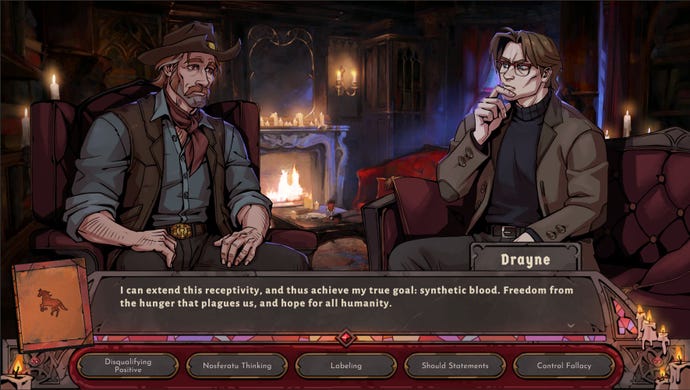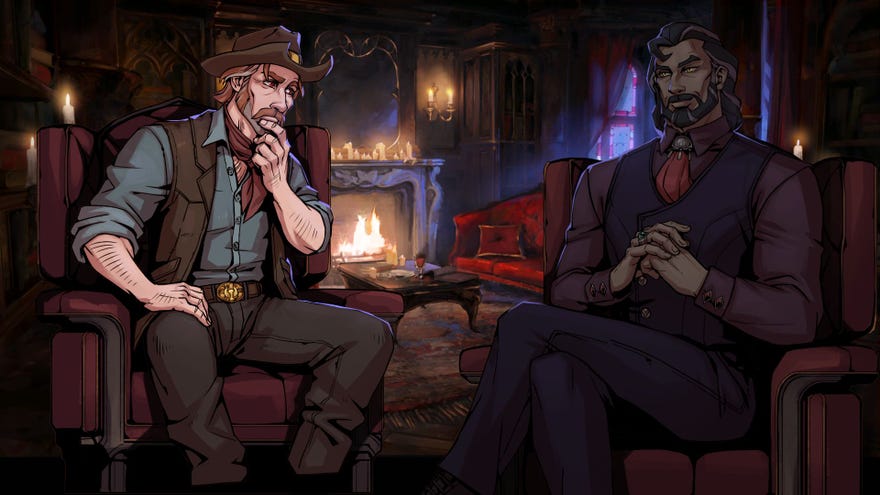Vampire Therapist is like playing language puzzles against different types of theatre kid
Fangs for the memories
My evolving relationship with Vampire Therapist continues apace - much how protagonist Sam's acumen as an unlicensed therapist for the unsettled undead develops at speed. He's a vampire doing therapy for other vampires, while also undergoing therapy, as a vampire, from another therapist (who is a vampire). Vampire Therapist! I've been able to get to grips with a playable preview - I'd say I got my teeth into it, but I'm not that much of a hack fraud - which means I got to see some of the things that creative director Cyrus Nemati told me about in our interview in action. I remain optimistic that, on it's release on June 18th, Vampire Therapist can walk the tricky line it's drawn for itself.
It's balancing on a knife point of humour, the supernatural, and sincerity about mental health, the latter using real cognitive behavioural therapy (CBT; the comments the first time I wrote about Vampire Therapist revealed a lot about our readership) concepts in consultation with licensed therapists. The preview only covered Sam's first meeting with his mentor, Andromachos, and the first client Sam treats himself - a doctor called Drayne, simultaneously self-loathing and self-aggrandising - but it gave a flavour of how the game plays. Rather than a sort of janky template on how to self-therapise, as I'd feared, when you're playing Vampire Therapist it operates more as a sort of language puzzle against different types of theatre kids.
CBT is about noticing unhelpful thought patterns so you can change them, and the behaviour associated with them. So, Andromachos - Andy - is there to teach Sam about different kinds of distortions, the unhealthy ways of thinking, so Sam can then point them out to his clients. One you learn early on is 'Labelling' which is when you describe yourself negatively - I'm a wrong'un, a good for nothing, or, in a vampire's case, an irredeemable mass murderer. The idea is that you may have murdered lots of people in the past, but a mass murderer isn't all you are, and you don't have to keep murdering people in the future - and when you label yourself it's hard to move past that label. Another is Should Statements, when you tell yourself you should behave a certain way and therefore put pressure on yourself when you fall short, or make otherwise pleasurable things into a chore.
The trick when you're playing is spotting these as someone talks to you - Drayne went through several in one conversation. He felt he should have made more progress in creating a synthetic blood substitute, didn't want to spend any time relaxing or resting, and was angry at himself for taking a drug that let him sleep and/or go to cool parties. You concentrate on what Drayne is saying in a way almost reminiscent of how you solve the translation puzzles in Heaven's Vault, separating the literal from the meaning behind the words.
Whether you agree with CBT or not is sort of irrelevant to the process of playing, because when you're playing the game that's not what you're thinking about. It seems obvious in hindsight, but this game doesn't include a crash course on the theory behind CBT, or have a mini lecture about CBT included in it. When you're talking to another character you don't get a big "this is CBT" sign flashing in neon in the corner. It's not at the forefront of your thinking.

I'm sure that some people might think it should be. I've alluded to it before, but CBT is the go-to for the NHS and is effective for a lot of people, but it does tend to treat the symptom rather than the underlying cause, so it has a lot of critics, too. It's inclusion in the game at all will put some people off, and that's understandable. But the demo was much more showcasing some larger-than-life vampires and their ostensibly supernatural problems still benefiting from, you know, having a chat with someone.
The characters, almost all of whom are voiced by Nemati himself, show a flair for the dramatic that I appreciate from vampires, and manage to be funny within that (there are other touches too: oblique references to Buffy The Vampire Slayer; Sam's coffin having a built in TV playing Nosferatu; vampires communicating with 'v-mail' and so on). You can see the potential for other issues to arise, as Andy operates out of a club where humans come to voluntarily offer up blood, and his current girlfriend is a human who works at the bar. Gotta be some weird relationship dynamics under the surface there, right? And I got invested in Drayne, despite him being the sort of person I wouldn't want to hang out with in real life. I hope that, when he comes back for another session in the full game, he's a bit more relaxed. You can wishlist Vamprie Therapist on Steam now, ahead of its release next month.









